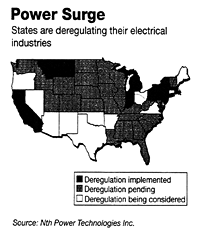Custom-Made Electricity
Wednesday, December 22, 1999 - Investor's Business Daily
Electricity supplied to, say, hospital operating rooms is more critical than the power used to run Nintendo games, most everyone would agree.
And in some industries, the slightest power surge can wreak havoc, where in a home it might merely make a light bulb flicker.
"People in chipmaking or computer processing, for example, are highly sensitive to even slight interruptions in power," said Hugh Holman, an analyst with BancBoston Robertson Stephens in Boston.
Companies, hospitals and others might be happy to pay a premium for ultra-reliable power. And many have, by installing emergency generators.
But there's a new option.
Internet-based software and other technology is making it possible to do something utilities have been unable to do: supply custom-tailored electric current.

In a nutshell, the technology lets companies sell different "grades: of electric current to different users, with customers communicating with power suppliers via the Web.
The grades of electricity differ based on reliability and stability. Users can pay more for super-reliable electricity and pay less for less reliable power.
Utilities can use Web-based software that links clients with power generation gear to ensure the proper power supply.
Homeowners looking to cut costs might be willing to settle for a lower grade of power reliability. In theory, this might leave homeowners open to more outages. Suppliers have two responses. For one, even the "less" reliable power would be very reliable. More than that, suppliers are talking about different "grades" of power for different parts of the home or business. That garage light could be supplied by the less-reliable power, while the refrigerator or heating system gets the most-reliable power.
Also pushing the trend toward graded electricity is that many states are deregulating local power industries. This lets small companies enter the market to compete against big utilities for the first time.
Small power providers with cutting-edge technology are expected to emerge across the U.S. Analyst Holman says this will whip up competition and push the idea of different prices for different grades of electricity.
"Customers will be able to choose power suppliers like they do phone carriers," Holman said.
One potential roadblock, though, is that the system might require rewiring electrical cables in some businesses and homes.
It also may require using the Internet to link power control gear used by utilities with other power control devices at the user's end. The Internet link will let the gear "talk to" each other in order to regulate power.
But there are other ways to provide such systems.
Power companies, for example, could attach smart chips or Net devices to the power lines of their customers to increase the stability and efficiency of their power systems.
These power-full ideas are catching a few eyes. Some venture capitalists are investing in firms that are developing what's come to be known as "power-quality technology."
"Power quality is the killer application that will bring distributed (power) into the market in a very big way," said Maurice Gunderson, a managing director of San Francisco-based Nth Power Technologies Inc., a venture capital firm that's invested $60 million in power quality firms.
Nth's investors include the Swiss power-generation maker ABB Asea Brown Boveri Ltd., Cincinnati-based power company Cinergy Corp. and France's Electricite de France.
Only a few power-quality products are being sold as yet. One is Internet-based energy management software from Alameda, Calif.-based Silicon Energy Inc. It lets power companies control output from generators using the Web.
Some companies in power-deregulated states like Texas have started to provide more stable power using the technology.
Austin, Texas-based Planergy Inc., a unit of regional utility New Century Energies Inc., has been using Silicon Energy's software to avoid brownouts and spikes.
More utilities will use such technology soon, says Peter Schwartz, chairman of Emeryville, Calif.-based consultant Global Business Network. "It'll be very widespread in about five years," he said.
One reason for the trend, says Gunderson is that the Net depends so much on power.
"Power-quality issues can bring the whole Internet industry to its knees," he said.
Still, the idea of different power quality for different users disturbs some observers.
"It used to be assumed that (the utilities) delivered quality service to you," said James Love, director of the Washington, D.C.- based Consumer Project on Technology, a group affiliated with consumer activist Ralph Nader. "Now they want to charge you more money because their service is unreliable."
Gunderson stresses the technology's pluses. One plus, he says is that Web-based software can direct different power grades to individual buildings or even floors in buildings such as to a hospital's emergency room.
A hospital could pay more for the power that runs its operating room and less for the electricity used to run its vending machines.
And devices linked to a customer's power lines can offload electricity during non-peak hours. The unused power could be re-sold, either by the customer or power company.
|